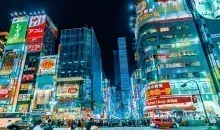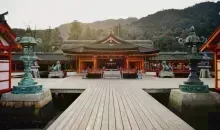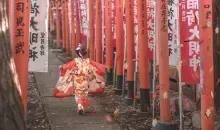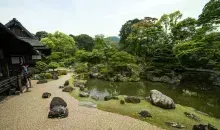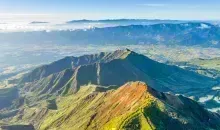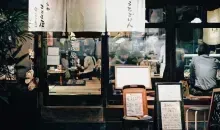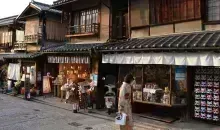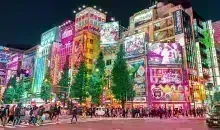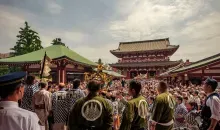Tattoo-friendly onsen and sento in Japan
- Published on : 18/11/2024
- by : Rita El.manaa
- Youtube
Onsen (natural hot springs) are a must-do experience in Japan, but for patrons with tattoos, access can sometimes be denied. However, here is a list of a few spots in different places throughout Japan that welcome guests even with ink art!
What are onsen?
Onsen are natural hot springs in Japan, known for their mineral-rich waters with relaxing and beneficial properties for the body. They come in a variety of forms, depending on the establishment offering them.
Onsens can be indoor or outdoor (rotenburo), and are often associated with traditional inns called ryokan, where visitors can relax and recharge their batteries in a classic Japanese setting.
Travelers often take a weekend getaway to onsen towns, which are places with a high concentration of hot springs and bathhouses.
Then, there are the sento, public baths that, unlike onsens, use non-thermal heated water. Sento are popular in urban areas and offer an alternative way to discover Japan's bathing culture, even if their waters don't have the same mineral properties.
Each type of establishment offers a unique facet of Japanese bathing culture, whether public, private or in the countryside.
Why don't onsen locations allow tattoos?
Historically, tattoos in Japan have been associated with the yakuza, the Japanese organized crime syndicate. Although perceptions have changed over time, and many foreigners and young Japanese are sporting tattoos with no connection to this culture, some onsen prefer to maintain a policy of prohibition for fear of upsetting their clientele. However, some establishments are beginning to open their doors to tattooed guests or to offer solutions such as tattoo covers or private baths.
Where can you find onsen that accept tattoos?
In and around Tokyo :
Onsen:
- Togoshi Ginza Onsen, Shinagawa, Tokyo. Onsen renowned for its skin-cleansing qualities, thanks to its black spring water mixed with sodium bicarbonate.
- Hasunuma Onsen, Ota, Tokyo. Onsen decorated in early 20th-century style, renowned for its natural spring waters and elegant interior. Several baths and a sauna are available.
- Heiwajima Onsen, Ota, near Haneda airport, Tokyo. This onsen also offers massages and a sauna.
- Yamato no Yu, Narita-shi, Chiba. Once in the water, you have a view of the satoyama and, if the weather is fine, you can see Mount Fuji in the distance.
- Sora no Yu, Narita airport , Chiba. An unusual onsen located at Narita airport, overlooking the runways.
- Tanmachi Yokujo, Yokohama. A spa establishment with its own onsen, accepting tattoos.
- Tenzan Onsen, Hakone. A spa complex with a restaurant, café, relaxation areas and, above all, onsen baths in the heart of nature. Only one tattooed person per group allowed.
- Hottarakashi, Yamanashi. This hot spring is less irritating than sulfur springs, making it suitable for people with fragile skin, the elderly and children. With a view of Mount Fuji!
- Day spa Honoka, Nikko. Features an onsen that accepts all tattoos.
Sento:
- PokaPokaLand Takaban no Yu, Meguro, Tokyo. Local sento open to tattoos, with several baths, salt saunas and a rooftop bath.
- Hinode-yu, Asakusa, Tokyo. Neighborhood sento accepting small tattoos, which can be easily hidden.
- Sengokuyu Nishihara, Shibuya, Tokyo. Spacious sento with two types of bath, high-temperature and low-temperature, and a sauna.
- Mannen-yu, Shinjuku, Tokyo. Retro-style sento with different types of baths, to experience a public bath as in old Japan.
- Myoho-yu, Ikebukuro, Tokyo. Sento in the heart of a pretty shotengai (traditional shopping district) where it's pleasant to stroll, eat and have a drink after your bath.
- Yudonbori Sakae-yu, Asakusa, Tokyo. Pleasant sento open to foreign travelers, with 7 types of bath, indoor and outdoor.
- Hisamatsuyu, Nerima, Tokyo. High-salt hot-spring baths and low-temperature neutral hypertonic hot-spring baths. Helps relieve body aches and stress.
- Yu-yu land Azuma, Ikebukuro, Tokyo. A traditional public bath with a beautiful sauna room.
- Sugamo-yu, Ikebukuro, Tokyo. Sento popular with locals, recently renovated, with several baths available.
- Kosigi-yu, Koenji, Tokyo. In the artistic district of Koenji, a simple, uncluttered sento with magnificent murals as decoration.
Ryokan and accommodation:
Many ryokans around Tokyo, especially in areas like Hakone or Atami, allow tattooed guests access to baths reserved for their guests.
- Cyashitsu ryokan Asakusa, Tokyo. You can reserve the private open-air rooftop bath, which offers a breathtaking view of the Tokyo Sky Tree and is surrounded by plants.
- Ryokan Kamogawa Asakusa, Tokyo. The ryokan welcomes tattooed guests and allows them to use the private bathrooms without restrictions.
- StaySakuraAsakusa, Tokyo. The ryokan features an open-air bath on the terrace.
- KAI Hakone, less than 2 hours from Tokyo. The ryokan offers a semi-open-air onsen.
- Emblem Flow, Hakone. Just steps away from Hakone Gora station, this nice hostel features an onsen carved in the rock.
- Centurion Hakone Bettei, Hakone. The ryokan uses natural hot spring water from Sengokuhara Onsen.
- Kaze no Terrace Kukuna hotel, Kawaguchiko. This ryokan has several baths, private baths, public baths and open-air baths with magnificent views.
Onsen towns within easy reach :
- Kusatsu Onsen: This is one of Japan's most famous resorts, attracting hot-spring lovers all year round. Every year, it is voted Japan's best onsen town.
Accessible in about 3 hours by train, with the JR Limited Express Kusatsu, then a local bus. - Hakone: A natural and cultural refuge near Mount Fuji, renowned for its onsen, spectacular views and museums, especially the open-air museum.
Only 30 minutes by train from Tokyo. - Kawaguchiko: A charming town on the shores of Lake Kawaguchi, with direct views of Mount Fuji and a wide range of activities.
Accessible in around 2 hours. Take the Limited Express Fuji Excursion train or express bus from Tokyo. - Ikaho: A historic spa known for its golden onsens and stone steps lined with traditional stores.
Approx. 2 hrs. 30 min. Take the Shinkansen, then a local train and bus. - Atami: A coastal town prized for its hot springs, beaches and spectacular summer fireworks.
About 40-50 minutes from Tokyo. Take the JR Tokaido Shinkansen train or a JR express train. - Nikko: A historical and natural treasure trove of UNESCO World Heritage shrines and breathtaking mountain scenery.
Accessible in around 2 hours. Take the Tobu Limited Express from Asakusa or the Shinkansen to Utsunomiya, then a local train to Nikko. - Kinugawa: A spa nestled in the gorge, popular for its onsens and proximity to theme parks, such as Edo Wonderland Nikko Edomura, a reconstructed village from the Edo period.
Approx. 2 hours from Tokyo. Take the Tobu Limited Express train to Kinugawa Onsen directly from Asakusa or via Shinjuku.
In and around Kyoto
Onsen:
- Kurama Onsen, in the mountains north of Kyoto, welcomes tattooed visitors, provided they inquire in advance.
- Candeo Hotels, The onsen at Candeo Hotels in Kyoto is a perfect fusion of Western spa and traditional Japanese baths.
- Dormy Inn, Kyoto, In addition to an authentic onsen experience, guests also enjoy complimentary ice cream, ramen and traditional Japanese kimonos after the bath.
- Kin no yu, in the mountains of Kobe, The water is a deep orange color thanks to its regenerating minerals.
- Arima Onsen, Kobe, is one of Japan's oldest spas, and many ryokans there allow tattooed guests to use the private baths.
- Funaoka Onsen, Kyoto. An authentic onsen offering hot spring water baths for men and women, as well as a guest house for rent.
- Hanaikada, Arashiyama, Kyoto. The gender-segregated open-air onsen offers breathtaking views of Togetsukyo Bridge, the Oi River and Mount Atago.
- Kitashirakawa Fudo Onsen, Kyoto. These onsen offer natural radium mineral springs taken directly from the granite at the back of the mountainside and contain numerous minerals that are highly beneficial to the body.
- Kinpeiro, Kyoto. Built around some of the oldest hot springs discovered in Kyoto. Although not considered luxurious.
Sento:
- Funaoka Onsen, Kyoto. This is one of the oldest sento in the city. After a visit to the Golden Pavilion, relax in this sento with several indoor baths ranging from hot, boiling to icy, and a small outdoor pool.
- Ginsui-yu, Kyoto. The water in the baths and showers is ultra-softened by a machine.
- Ume-yu, Kyoto. Traditional public bath offering several hot and cold pools, sauna, whirlpool and toiletries.
- Hinode-yu, Kyoto. A traditional neighborhood sento where you can enjoy the nostalgia of the Showa era.
- Gokuyu, Kyoto. Naturally warm waters bubble to the surface at this spa offering free treatments.
- Hakusan-yu Takatsuji, Kyoto. Former store now a sento, offering various baths.
Ryokan:
Ryokan in the Kyoto region, in spa towns such as Arashiyama, often offer private baths in their rooms, perfect for tattoo artists.
- Biwako Ryokusuitei, Kyoto. The ryokan offers a breathtaking view of Lake Biwa, and is ideal for relaxing after a day exploring Kyoto.
- Kyoto Arashiyama onsen Kadensho, Kyoto. Combines traditional baths with a Zen atmosphere, perfect for an authentic relaxation experience.
- Hotel New Wakasa, Nara. The Hotel New Wakasa in Nara invites guests to recharge their batteries in soothing thermal baths, while offering an unforgettable cultural experience in a historic setting.
- Nishimuraya Shogetsutei, Kinosaki Onsen. This iconic ryokan in Kinosaki Onsen is famous for its private and public baths.
- Tsubakino ryokan, Kinosaki Onsen. This ryokan offers the perfect getaway with its open-air baths, where guests can relax while admiring the natural landscape of Kinosaki Onsen.
- Arima Grand Hotel, Arima Onsen. The Arima Grand Hotel, one of Japan's oldest onsens, offers a luxury spa experience with mineral-rich waters renowned for their skin and body benefits.
- Hashinoyan Bekkan Rensui, Arima Onsen. This refined ryokan is renowned for its thermal baths using iron-rich "golden" spring water, ideal for revitalizing and soothing the body.
Onsen towns within easy reach:
- Kinosaki Onsen kinosaki: Renowned for its seven public baths, Kinosaki offers a number of onsen where tattooed people can bathe without difficulty.
Accessible by train from Kyoto and Osaka in 2.5 hours, and by bus from Osaka in 3 hours. - Arima Onsen: One of Japan's three oldest spa towns, famous for its golden and silver springs.
Accessible by 1h15 bus from Kyoto or Osaka. - Shirahama Onsen: A seaside resort offering onsen by the sea and a white sand beach.
Reachable in 2h30 by train and bus from Osaka, or 4h from Kyoto (it's advisable to do Kyoto → Osaka first). - Kaga Onsen: A group of onsen villages near Kanazawa, perfect for discovering the art of relaxation in a traditional setting.
Accessible in 1h45 by train from Kyoto. - Doragawa Onsen: Located in the Nara mountains, this small resort is known for its peaceful atmosphere and onsen surrounded by nature.
Accessible in 1h30 by train, followed by a bus ride.
Main onsen towns with authorized tattoos
Onsen towns in the rest of Japan
- Beppu: This Kyushu town has public onsen and baths reserved for ryokan guests, which can be a good alternative for tattooed visitors.
- Noboribetsu Onsen: This famous spa town in Hokkaido allows tattooed visitors to use private baths in several ryokan. The nearby "Sunlaiva" ski resort is ideal for confident beginners and is generally incredibly quiet.
- Dogo Onsen: This onsen inspired the bathhouse in the film "Chihiro's Journey". It is also one of Japan's oldest hot springs.
- Nozawa Onsen: Nozawa Onsen is a mountain village known for its ski slopes and hot baths.
- Ginzan Onsen : Thanks to its streets, it is considered one of the most beautiful onsen villages in Japan.
- Kurokawa Onsen : Known for its outdoor baths between rivers and forests.
- Zao Onsen: Zao Onsen's sulfuric waters are among the most acidic in the country, with a pH close to 1.
- Ibusuki Onsen: Ibusuki Onsen is renowned for its hot sand baths, known as sunamushi, in which the sand is naturally heated by an underground hot spring. This treatment opens pores, improves circulation and increases blood oxygenation levels, and is a perfect complement to thermal baths.
Tips if your tattoos are not accepted :
- Opt for a private bath: Many establishments offer reserved baths, allowing visitors to enjoy their baths without restriction.
- Use tattoo covers: In establishments where tattoos are not totally forbidden, tattoo covers can be bought or requested to temporarily hide the designs.
- Find out in advance: Check onsens' websites to verify their policies. Some offer special opening hours for tattooed visitors.
- Choose establishments for foreigners: In tourist areas, many onsens adopt more flexible rules for welcoming international visitors with tattoos.
In short, while some onsens in Japan still forbid access to tattooed people, there are many options where these restrictions are relaxed. Whether you're looking to enjoy a private bath or discover a large onsen complex, there's always a solution for tattooed travelers.












